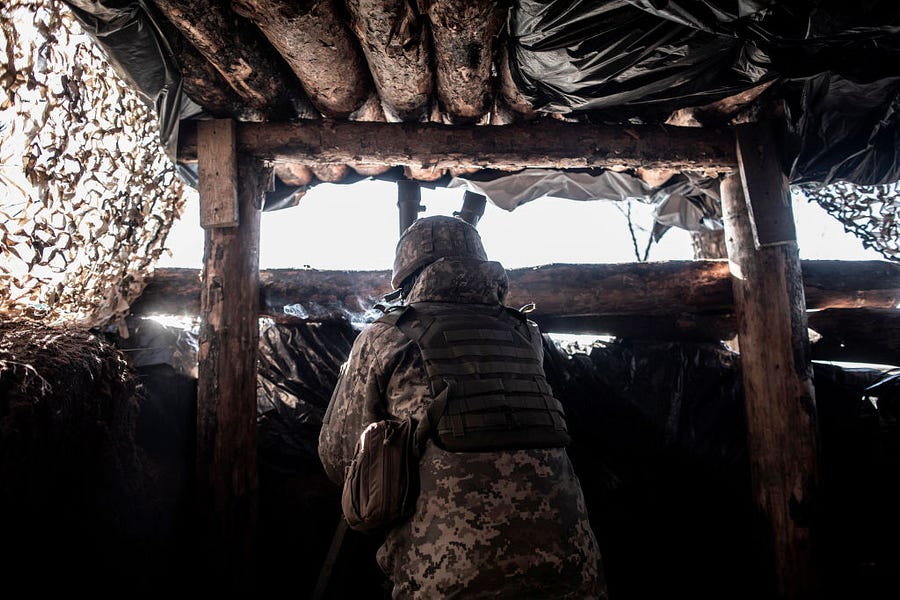The week appeared to open with the West on the brink of geopolitical disaster.
Three months into Russia’s buildup of troops and arms near Ukraine’s border, the Biden administration informed the world that President Vladimir Putin had successfully concentrated sufficient force to launch a further invasion at “any time,” including before the conclusion of the Olympic games in Beijing. Such an attack could topple President Volodymyr Zelensky’s government in Kyiv within 48 hours and leave 25,000 to 50,000 civilians dead. Accordingly, the U.S. State Department moved its embassy from Ukraine’s capital to Lviv, a Western city near the Polish border, and urged citizens to flee while the option remained.
“American citizens should leave now,” President Joe Biden told NBC’s Lester Holt in a rare sit-down interview. “It’s not like we’re dealing with a terrorist organization. We’re dealing with one of the largest armies in the world. It’s a very different situation, and things could go crazy quickly.” The president reportedly told Zelensky and other world leaders to expect an attack by Tuesday or Wednesday.
But then, at the height of the West’s alarm, the Kremlin appeared to stand down. Russian Foreign Minister Sergei Lavrov on Monday reportedly told Putin that the West demonstrated “a willingness to enter into serious negotiations” and was “no longer able to just ignore” Moscow’s security concerns. On Tuesday, Putin claimed to have begun a “partial” withdrawal of the Russian troops stationed near Ukraine’s border.
But any sigh of relief proved premature. On the ground, the Russian military moved to fortify its existing buildups, mobilizing troops and artillery to various attack positions along Ukraine’s border. In cyberspace, a cascade of hacks of likely Russian origin took down Ukrainian government and bank websites in what a security service official told The Dispatch was the country’s “most powerful” cyber incursion of its kind to date. And in state media, propagandists redoubled their efforts to sow the seeds of a justified Russian intervention in Ukraine’s eastern Donbas region, where Kremlin-backed rebel groups reignited hostilities along the frontline.
Keeping the West guessing is key to Moscow’s overall geopolitical posture. Putin’s latest moves could be last-ditch bluffs to force concessions from the West. They could be bait to draw Ukraine into a broader conflict. They could also be a way for Putin to go through with his stated drawdown without projecting weakness. Very few, with the possible exception of Putin’s inner-circle, know what to expect next.
“He loves options,” Jim Townsend, former U.S. deputy assistant secretary of defense for Europe and NATO, told The Dispatch. “Don’t believe people who tell you they know the answer, because no one does. We’re just going to have to wait and see.”
According to John Sipher, a 28-year veteran of the CIA and former head of its Russia operations, Putin’s disinformation campaigns during geopolitical crises is a time-tested strategy. “Putin’s a former KGB officer. He’s into the whole game of deception and covert operations. In fact, if you look back at 2008, when they went into Georgia, they did the same thing,” he told The Dispatch. “They announced to the world they were pulling out, they moved a few troops out, and then they went in.”
Further complicating the picture are Moscow’s concerted efforts to undermine the West’s public trust in intelligence agencies and media outlets.
When midweek came and went without an invasion, Russian officials and some commentators in the West mocked the timeline as the reputed blunder of faulty U.S. intelligence and scaremongering U.S. media. “February 15, 2022 will go down in history as the day of failure of Western propaganda war,” Russian foreign ministry spokeswoman Maria Zakharova said Tuesday. “Embarrassed and destroyed without firing a shot.”
Kremlin spokesman Dmitry Peskov, appearing on the state-controlled Channel One news station Thursday, told foreign outlets that Russia expects “more serious and more responsible” coverage going forward: “Truth be told, I’m not sure about their audience, but our audience simply has a good laugh at this. Let their readers probably understand at last how much the authority of their news media is worth.”
Notwithstanding Russian jeers, U.S. and Ukrainian leadership cautioned the world against taking the Kremlin’s de-escalation at face value. While a drawdown of forces “would be good,” Biden said in a speech Tuesday, “more than 150,000 troops”—the then-highest government figure disclosed—surrounded Ukraine’s borders. On Wednesday, a senior administration official told reporters that 7,000 additional troops had recently deployed to join them.
“We in Ukraine have a rule: We don’t believe what we hear, we believe what we see,” Ukrainian foreign minister Dmytro Kuleba said Tuesday. “If a real withdrawal follows these statements, we will believe in the beginning of a real de-escalation.”
As the week unfolded, Moscow’s behavior seemed to vindicate the “I’ll believe it when I see it” posture of its adversaries.
Putin unnerved the world on Tuesday when he declared clashes in eastern Ukraine a “genocide,” invoking the same language weaponized to justify his 2014 invasion. In the days since, Russian media has released a torrent of unverified reports by the separatist Donetsk and Luhansk republics alleging renewed aggression by Kyiv along the line of contact. “The risk of moving from mud-slinging to consequences that would cause a new outbreak of war in the immediate vicinity of our borders is always lurking,” Peskov said Thursday, priming onlookers for escalation.
The uptick in alleged ceasefire violations coincided with the Investigative Committee of Russia’s release of a report claiming to have uncovered mass graves of civilians killed in Ukrainian shelling. “The intent to exterminate the inhabitants of Donbass is obvious,” the pseudo-investigation alleged.
Ironically, Moscow leveled the new accusations against the backdrop of renewed attacks by its local proxies. On Thursday, separatist militias shelled a school in Luhansk with 53 children and 16 adults inside, injuring two, in an apparent effort to provoke a response by Kyiv. Russian media later published the rebel group’s denial of responsibility.
The group also alleged Ukrainian President Zelensky “personally issued the order to escalate the conflict” in the Donbas following his visit near the frontline.
“Everyone in his right mind understands that this [is] another trick of Russia. They are playing that ‘that’s not us’ game,” Ivan Syniepalov, a translator based in the eastern Ukrainian city of Mariupol, told The Dispatch. “Out of 47 violations of [the] ceasefire that they made today, 38 were made with an artillery that is forbidden by the Minsk agreement. But they pretend that that’s not them. So when (and if) Ukraine responds, they will play victim.”
To deny them space to do so, the Biden team has adopted a novel approach. From the outset of Russia’s “large and unusual” concentration of forces along Ukraine’s border in November, the U.S. government has shared—both in public statements and media leaks—an unprecedented volume of intelligence with the public. In perhaps the most jolting instance, State Department spokesman Ned Price appeared before reporters to outline the specifics of a planned “false flag” operation by Russia, including a fake Ukrainian offensive and real corpses to lend pretext to an invasion (though Price refused to provide proof of the allegation when pressed by reporters).
In a speech before the UN Security Council Thursday, U.S. Secretary of State Antony Blinken detailed a host of additional fabricated pretexts at Moscow’s disposal, including Putin’s unfounded accusations about genocide and ethnic cleansing in the Donbas. “In the past few days, Russian media has already begun to spread some of these false alarms and claims, to maximize public outrage, to lay the groundwork for an invented justification for war,” Blinken said.
“It’s whack-a-mole. We expose something and he does something else, we expose that and he does something else,” said Townsend. “This is trying to counter the narrative and counter the tactics. We’ll have to see if it works. The jury is still out, but I think it’s making him delay.”
While the method gives the Kremlin room to change course and cast doubt on the U.S. intelligence community—as Putin appears to have done at least once already—it also forces him to rethink the compromised plans.
“In this case, there’s only one target and that’s Putin,” Sipher explained. “So if we put out intelligence about what the Russians are up to, he knows if it’s true or not. It doesn’t matter really if the American public does or if journalists do. If Putin knows that we’re onto him or we know the things he’s doing, he’s gotta wonder: ‘What else do they know? How do I change my tactics?’ The administration is trying to throw everything they can against the wall in the hopes that, at some point, it’ll be the straw that broke the camel’s back and he’ll back off.”
Taken together with the promise of a unified NATO response to any further incursion, the U.S. appears to be placing its bets on a policy of deterrence over appeasement.
“We’ve been saying since the middle of November that there will be three elements to what we do: more arms to Ukraine, plusing up NATO forces in the east, and truly devastating sanctions,” John E. Herbst, senior director of the Atlantic Council’s Eurasia Center and the former U.S. ambassador to Ukraine, told The Dispatch. “I think any rational calculation would suggest that this is too risky an enterprise for Putin.”
The examples of Georgia and Ukraine—swaths of which remain under Russian occupation after respective invasions in 2008 and 2014—demonstrate the consequences of meeting Moscow’s aggression with concessions. While the outcome of the current crisis remains uncertain, the last three months have dispelled any notion that Putin shares the West’s desire for a “stable and predictable” relationship.
“He creates a fake crisis and then wants handouts, gifts to stop the crisis. We didn’t play the game this time,” Sipher said. “We’re going to have to change the way we think about dealing with him, because it’s clear now from what he’s doing that we’ve mishandled Russia in the past.”









Please note that we at The Dispatch hold ourselves, our work, and our commenters to a higher standard than other places on the internet. We welcome comments that foster genuine debate or discussion—including comments critical of us or our work—but responses that include ad hominem attacks on fellow Dispatch members or are intended to stoke fear and anger may be moderated.